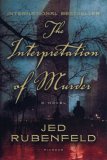Summary | Excerpt | Reading Guide | Reviews | Beyond the Book | Readalikes | Genres & Themes | Author Bio

A Novel
by Jed Rubenfeld
His eyes were another matter. Brill had warned me about them. As
Freud descended the ship’s ramp, his eyes were fearsome, as if
he were in a towering temper. Perhaps the calumny he had long
endured in Europe had worked a permanent scowl into his brow. Or
perhaps he was unhappy to be in America. Six months ago, when
President Hall of Clark University—my employer—first invited
Freud to the United States, he turned us down. We were not sure
why. Hall persisted, explaining that Clark wished to confer on
Freud the university’s highest academic honor, to make him the
centerpiece of our twentieth-anniversary celebrations, and to
have him deliver a series of lectures on psychoanalysis, the
first ever to be given in America. In the end Freud accepted.
Was he now regretting his decision?
All these speculations, I soon saw, were unfounded. As he
stepped off the gangway, Freud lit a cigar—his first act on
American soil—and the moment he did so the scowl vanished, a
smile came to his face, and all the seeming choler drained away.
He inhaled deeply and looked about him, taking in the harbor’s
size and chaos with what looked like amusement.
Brill greeted Freud warmly. They knew each other from Europe;
Brill had even been to Freud’s home in Vienna. He had described
that evening to me—the charming Viennese house filled with
antiquities, the doting and doted-on children, the hours of
electrifying conversation—so often I knew his stories by heart.
From nowhere a knot of reporters appeared; they gathered around
Freud and yelled out questions, mostly in German. He answered
with good humor but seemed baffled that an interview should be
conducted in so haphazard a fashion. At last Brill shooed them
away and pulled me forward.
“Allow me,” Brill said to Freud, “to present Dr. Stratham
Younger, a recent graduate of Harvard University, now teaching
at Clark, and sent down by Hall specially to take care of you
during your week in New York. Younger is without question the
most talented American psychoanalyst. Of course, he is also the
only American psychoanalyst.”
“What,” said Freud to Brill, “you don’t call yourself an
analyst, Abraham?”
“I don’t call myself American,” Brill replied. “I am one of Mr.
Roosevelt’s ‘hyphenated Americans,’ for which, as he says, there
is no room in this country.”
Freud addressed me. “I am always delighted,” he said in
excellent English, “to meet a new member of our little movement,
but especially here in America, for which I have such hopes.” He
begged me to thank President Hall for the honor Clark had
bestowed on him.
“The honor is ours, sir,” I replied, “but I’m afraid I hardly
qualify as a psychoanalyst.”
“Don’t be a fool,” said Brill, “of course you do.” He then
introduced me to Freud’s two traveling companions. “Younger,
meet the eminent Sándor Ferenczi of Budapest, whose name is
synonymous throughout Europe with mental disorder. And here is
the still more eminent Carl Jung of Zurich, whose Dementia will
one day be known all over the civilized world.”
“Most happy,” said Ferenczi in a strong Hungarian accent, “most
happy. But please to ignore Brill; everyone does, I assure you.”
Ferenczi was an affable sandy-haired fellow in his late
thirties, brightly attired in a white suit. You could see that
he and Brill were genuine friends. Physically, they made a nice
contrast. Brill was among the shortest men I knew, with
close-set eyes and a wide flat-topped head. Ferenczi, although
not tall, had long arms, long fingers, and a receding hairline
that elongated his face as well.
Copyright © 2006 by Jed Rubenfeld




Great political questions stir the deepest nature of one-half the nation, but they pass far above and over the ...
Click Here to find out who said this, as well as discovering other famous literary quotes!
Your guide toexceptional books
BookBrowse seeks out and recommends the best in contemporary fiction and nonfiction—books that not only engage and entertain but also deepen our understanding of ourselves and the world around us.